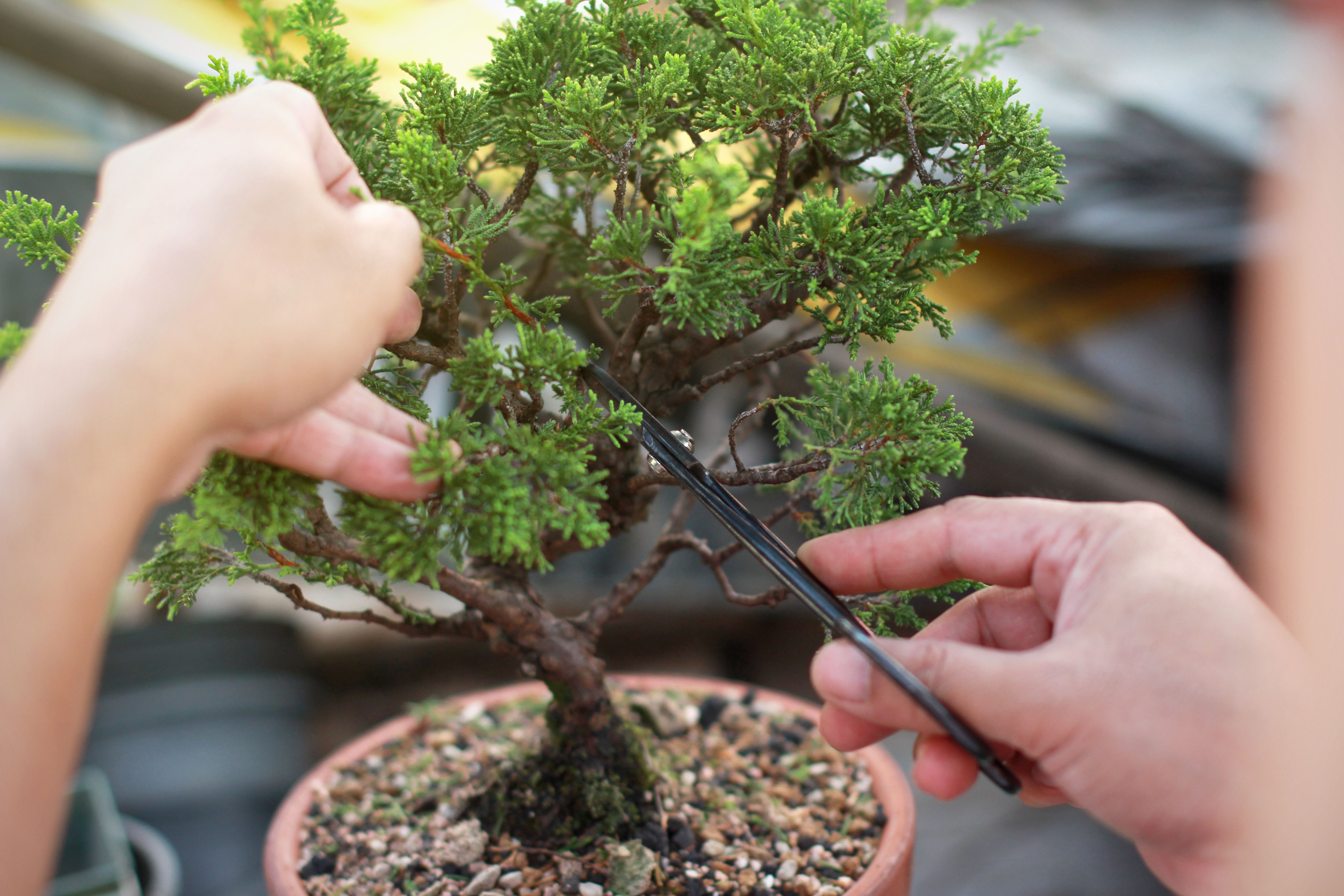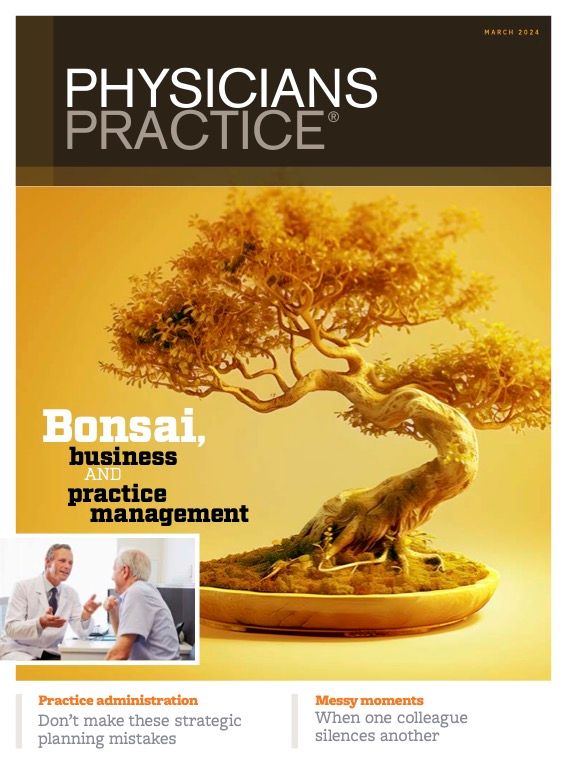- Industry News
- Law & Malpractice
- Coding & Documentation
- Practice Management
- Finance
- Technology
- Patient Engagement & Communications
- Billing & Collections
- Staffing & Salary
Bonsai, business, and practice management
Growing bonsai takes patience and the right tools, just like growing your practice.
© Nori Wasabi - stock.adobe.com

I've been fascinated with bonsai trees– especially how bonsai fans can be so dedicated to nurturing their botanical garden that the bonsai plant becomes a miniature version of its full-sized relatives. I never thought a small tree could provide lessons about healthcare and managing a medical practice. Yet, on further reflection, I believe several comparisons that apply to physicians and medical practices are worthy of mention.
It is not easy to raise and care for a bonsai plant, just as starting, growing, and maintaining a medical practice takes work. If we can successfully nurture a bonsai plant, then we can also manage to care for and nurture our patients and our medical practice. This blog compares nurturing bonsai plants with the care and feeding of medical practice.
Bonsai plants often have problems that emerge when the routine is changed. Bonsai plants don't take kindly to changes in their water or exposure to light routines. The same holds true in your practice. The practice only runs smoothly when you deviate from the routine or the schedule. Suppose the doctors are to arrive at 8:45 and start seeing patients at 9:15. In that case, the staff is prepared, the patients are in the rooms, the phone is taken off the answering service, and everyone seems to be on the same page. If the doctor decides to arrive at 9:30, check e-mails, return a few phone calls, and begin seeing patients at 9:45 or 10:00, there will be mayhem in the office. Patients become surly, the staff are agitated, and no amount of hurrying can get the practice back on schedule.
The same applies to hospital operating rooms (ORs). If the OR expects the doctor at 7:30 and they show up at 8:00, the entire OR schedule is delayed, and other doctors, patients, and OR staff will be upset. This will have a trickle-down effect on everyone involved.
Let the bonsai plant provide you with the first lesson, i.e., having a routine—rarely, if ever, should you deviate from the routine you and your staff have agreed upon.
Pruning is the art of retarding the growth of the tree to keep its miniature status and size. To have a fuller, miniature plant, it is necessary to trim back the branches.
How often do you review your practice's balance sheet, looking at your assets and liabilities? How often do you look at your EOBs or denials of claims submitted to the insurance companies or the CMS? A successful practice does not run on autopilot. You must review the key performance indicators* (KPIs). These important metrics indicate the growth or the decline of your practice. When you identify problems, that is the time to consider pruning what isn't working, such as dropping low-paying payers and looking for new sources of revenue, such as offering early morning hours, evening hours, same-day appointments, or Saturday morning appointments. Pruning is a necessity for a healthy bonsai plant and a necessity for a healthy practice.
Caring for a bonsai plant takes a mister, measuring cups, and small pruning shears. But if you want to provide outstanding care for your bonsai plant, the experts recommend a soil moisture tester. You must have the right tools to provide optimum care for your plant.
You can enhance your practice's efficiency and productivity if you ensure the staff has the right tools, including the right technology. For example, is your website allowing your patients to make an appointment online? Does the website offer the demographic forms and the health questionnaire for patients to complete before they come to the office for their first appointment? This single feature can make the practice more efficient. Your patients will appreciate being seen on time instead of spending 20 to 30 minutes completing forms in the reception area before being seen by the staff and the doctor.
As with bonsai plants, resources and tools can make all the difference in the world! Make every effort to give your employees the skills and technology to let them do great work and be their most productive.
Pay attention to careful potting of the plant to ensure that the soil drains quickly, and keeping a moisture tray underneath it will allow the plant to believe that it is growing in the exact same conditions as its natural habitat.
I have observed that happy doctors and happy office managers create a milieu that makes for happy staff, who, in turn, give patients a positive experience. Sometimes, obtaining this atmosphere is as simple as changing the verbiage or the language used. For example, suppose you call the area that patients enter when they open the door to the practice the waiting room. In that case, you are almost creating a self-fulfilling prophecy that the patients will wait before they are seen. However, if you change the term to the reception area, you create the aura where patients will be received and will be seen and processed very quickly. Changing this one term makes patients feel appreciated and that they are doing the doctor a favor by being part of the practice rather than the other way around—that is, the patient is the one who is making the effort rather than the doctor doing the patient a favor by providing healthcare.
Unless you are a bonsai "maven,"** you must periodically ask for advice on managing your beloved plants. You may not know it all, and you will likely have to consult with a bonsai doctor when your plant fails to thrive. Likewise, your practice will occasionally need to consult with an expert to solve employment problems, establish a sexual harassment policy, or advise on taxes and investments. As with the bonsai plant, asking for help is not a sin. It may save your bonsai and your practice.
Too much or too little water will cause your plant to wither on the vine. The same applies to a doctor's reputation. Physicians spend their entire lives building and protecting their reputations. Most patients have a favorable impression of the doctor and the practice. An angry patient with a bad experience can wreak havoc on a medical practice. Today, a patient who posts negative comments about the doctor and the practice can see their invective seen by thousands of viewers with just a mouse click. Therefore, physicians must take an active role in protecting their reputations. The best way to do this is to capture compliments from happy patients when they utter their accolades. This can be done by asking patients to share their experiences with one of the online review sites. I suggest to the patient in the exam room that they rate their experience with the practice at the POS or point of service.
Bottom Line: Lessons for practice management are available in books and MBA schools and in the flora and fauna of our surroundings….or desktop...if that's where you keep your treasured bonsai plant.
*Examples of KPIs are monthly charges\receipts, accounts receivables, RVUs, denials, number of new patients
**Yiddish word for “expert”
Neil Baum, MD, a Professor of Clinical Urology at Tulane University in New Orleans, LA. Dr. Baum is the author of several books, including the best-selling book, Marketing Your Medical Practice-Ethically, Effectively, and Economically, which has sold over 225,000 copies and has been translated into Spanish.
Asset Protection and Financial Planning
December 6th 2021Asset protection attorney and regular Physicians Practice contributor Ike Devji and Anthony Williams, an investment advisor representative and the founder and president of Mosaic Financial Associates, discuss the impact of COVID-19 on high-earner assets and financial planning, impending tax changes, common asset protection and wealth preservation mistakes high earners make, and more.

